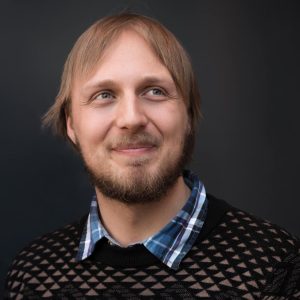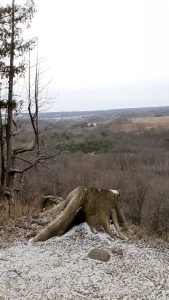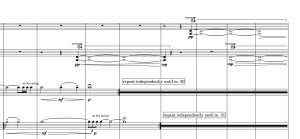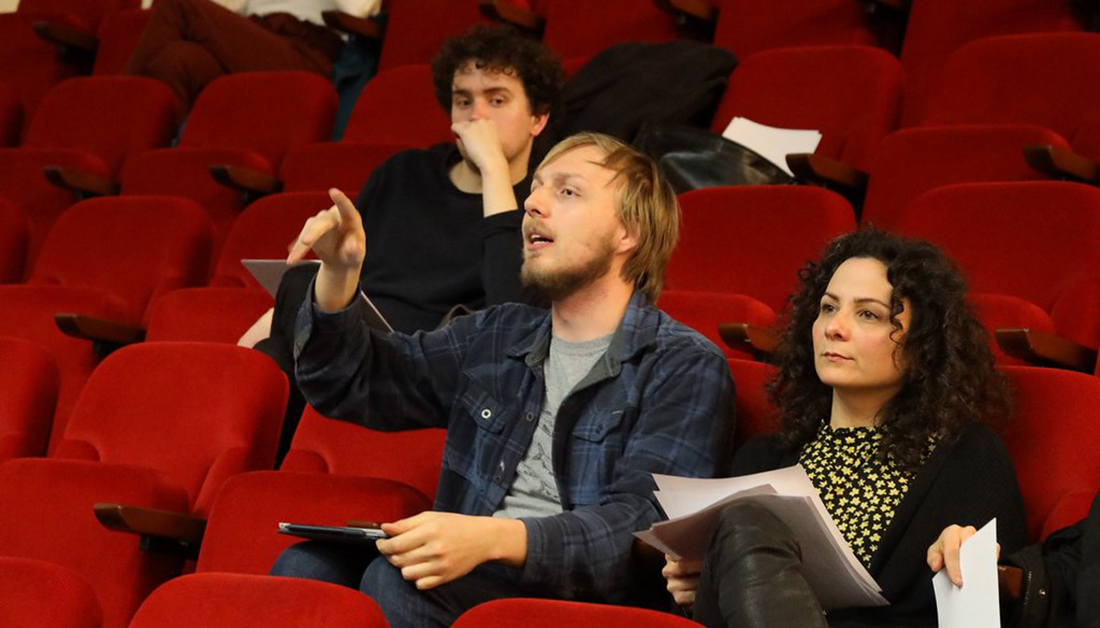
CMC Ontario Regional Director Joseph Glaser sat down with HPO composer fellow, Arie Verheul van de Ven to discuss his participation in the Hamilton Philharmonic Orchestra Composer Fellowship program.
The program was launched in collaboration with the Ontario Region of the Canadian Music Centre in our 18-19 Season. The program is aimed at connecting early career composers with professionals in the orchestral world to nurture and develop new skills through mentorship and the creation of a new work.
On May 1st, 2022, the Hamilton Philharmonic Orchestra Premiered Arie’s work Lithification conducted by Daniel Black as the culmination of Arie’s fellowship with the orchestra.
Joseph Glaser: Tell me a little bit about your background, how did you get into music?
Arie Verheul van de Ven: I grew up in a family of musicians, both my parents are clarinetists. When I first started going to symphony concerts, I realized that I recognized all these pieces, not from their famous melodies, but from all the clarinet excerpts that my parents had been practicing around the house my whole life, which is, to me, a hilarious way in to this music. My parents’ kind of tricked me into learning an instrument, telling me that, similar to how everyone had to go to school, everyone also had to pick an instrument. I ended up picking the violin then switched to viola later on. At the high school I went to, there was a film program, so I got into composing by working on scores for films my friends were working on. From there I realized that I really liked having ideas about music and thinking about music and making it on my computer, not being limited to the one instrument I knew how to play.
JG: I feel like there is a disproportionate number of composer-violists in music history.
AVvdV: The connection between playing the viola & becoming a composer makes a lot of sense to me in relation to my own personal musical journey. For me, starting out as a kid on violin, the violinist to viola pipeline was already a way to escape the high intensity, high pressure environments of being a violin student, something I just couldn’t manage. Subsequently, becoming primarily a composer was a similar process. Where I live in the classical music world, even on viola, performance pressure and standards are very high. I can manage it, but do I want to spend my whole life stressed out about performances? Now I still get stressed out about performances but at least I don’t have control over it!
JG: You’re now living in Toronto again after having spent some time in Kitchener and in the Netherlands. Tell me a bit about your experience in all those places. How are they different? How are they similar?
AVvdV: Unfortunately, I was just starting to get to know the scene in the Hague in the Netherlands, especially before I had to come back because of COVID. What I found really interesting there is that you could make a living being exclusively a free improvising musician. Whereas here it’s generally just a part of your life. It would probably be pretty hard for that to be your primary work, but very hard for it to be all of your work. I found it interesting that New Opera was advertised on banners on the street in the same way you would see advertisements for Mirvish Theatre in Toronto. What was amazing about Kitchener was that you really could convince people to come out to shows. We had this composer collective there, called the Yacht Club, and we produced our own shows of music entirely written by us, often with a theatrical component. We put these large-scale theatre concerts together and we were able to break even, and that always struck me as something that’s really hard to do in Toronto. Kitchener is a smaller city, and it doesn’t strike you as a place that would really have this vibrant arts community at first glance but then you dig just a little bit under the surface and there’s all this incredible stuff going on.
JG: Tell me a bit about the piece, how did you approach translating geology into music?
 AVvdV: Something I’m trying to understand, both artistically and also as a human being, is the question of why different places feel different. I guess that’s maybe a reductive way to put it, but I’m really curious about how, if I spend time in the Hague or in Toronto, I’m aware of how the ways those places are built and also their histories change the way that I feel every day, the way that I act, and the way that I navigate. For example, I find when I’m in Toronto, I’m navigating with an internal compass that’s oriented around the grid of the city with the center on the lake and the [CN] Tower. In that way I always know where south is. In the Hague, when I’m on a bicycle, I suddenly started navigating through landmarks and thinking about where I was going rather than where I was spatially, also where I could turn safely! I want to figure out what’s going on there that creates each geographic locations’ uniqueness. The geological theme of this was a way for me to get at something geographically specific to Hamilton. I ended up going on this walk on the Niagara escarpment and seeing the lake. There are so few places in this part of Ontario where you can really see the “spectacularness” of geology, where you can see how glaciers scooped land out into the lake, and how this process is still happening. So that was something that immediately made me think of sounds. It’s funny because I started out with this idea that I’ll write a piece of music that’s about geological history and the process of lithification and erosion that lead to the Niagara escarpment, and that’s the plan, but then I realize three bars in that I have to abandon it. Because, while I love writing pieces where every decision is completely conceptual, sometimes the sounds that the concepts inspire become more interesting to me than the concepts themselves
AVvdV: Something I’m trying to understand, both artistically and also as a human being, is the question of why different places feel different. I guess that’s maybe a reductive way to put it, but I’m really curious about how, if I spend time in the Hague or in Toronto, I’m aware of how the ways those places are built and also their histories change the way that I feel every day, the way that I act, and the way that I navigate. For example, I find when I’m in Toronto, I’m navigating with an internal compass that’s oriented around the grid of the city with the center on the lake and the [CN] Tower. In that way I always know where south is. In the Hague, when I’m on a bicycle, I suddenly started navigating through landmarks and thinking about where I was going rather than where I was spatially, also where I could turn safely! I want to figure out what’s going on there that creates each geographic locations’ uniqueness. The geological theme of this was a way for me to get at something geographically specific to Hamilton. I ended up going on this walk on the Niagara escarpment and seeing the lake. There are so few places in this part of Ontario where you can really see the “spectacularness” of geology, where you can see how glaciers scooped land out into the lake, and how this process is still happening. So that was something that immediately made me think of sounds. It’s funny because I started out with this idea that I’ll write a piece of music that’s about geological history and the process of lithification and erosion that lead to the Niagara escarpment, and that’s the plan, but then I realize three bars in that I have to abandon it. Because, while I love writing pieces where every decision is completely conceptual, sometimes the sounds that the concepts inspire become more interesting to me than the concepts themselves
JG: Your work often involves participatory or devised elements, did any lessons from those techniques make their way into this piece? Where you able to bring some kind of community engagement to your role with the HPO?
AVvdV: While I was writing this piece for the HPO I was also working with the Gather Round Singers, which is a community choir run by Jumblies Theatre. For most of the pandemic, we’ve been meeting on zoom. My role up until last February was to write music that was possible for us to sing over Zoom. So, in my mind, these two projects felt like polar opposite situations. On the one hand I need to find a method of composing that was vague enough that it would make sense in an online space where precision becomes impossible. Music that could function without any consistent sense of rhythm or meter, without the need for people to really sync up, without the need for people to even be accurate with their pitch, but was also still satisfying musically. On the other hand, I was working on writing for orchestral musicians which is so much about being really hyper-precise and being so specific with your instructions. During the process the two really felt separated, but looking back on it, one thing I really learned from writing music for community arts situations is that you’re writing music for people. The parts on the notation software may say “flute” but that’s a human being that you’re probably going to meet. It’s really hard to build those relationships in typical orchestral situations, because you’re in your “composer hole” making a PDF and then you meet for 30 minutes of rehearsal. What was really awesome about the HPO project was being able to really spend time with musicians and get to know them. I had lots of great, really interesting conversations with Jean Norman [Iadeluca], the principal timpani player, Neil Spaulding who was playing second horn, and my mom [Michele Verheul] who gave me lots of great woodwind advice. When we write we often still think of the work as the score, which is actually a set of instructions for particular instruments, and in most situations, we don’t expect the piece to get more than one performance, so why not bring that focus in to the actual individual human beings who are giving the premiere performance.

Excerpt from Lithification
JG: How was the experience with the HPO?
AVvdV: It was so educational, I learned so much. For one thing, just to be able to work with the musicians, especially over the last weekend when we had the rehearsals. Working with musicians who are actively dedicated to making your music work was really wonderful, especially Composer Mentor Abigail Richardson-Schulte and Daniel Black, the guest conductor for the concert. Daniel was really dedicated to making the piece work and took the time with my piece and gave me some really wonderful feedback. In addition to this wonderful experience putting the piece together, I also got to learn and understand how these very large ensembles and organizations function as organizations. Getting to sit in on various meetings, understanding how the various roles within the administration allow for these concerts to happen. It’s really an incredible event to get 50 musicians on stage to do anything, and these kinds of organizations are able to do it multiple times a year. I also got to do a lot of really fun community work. We went to different libraries in Burlington and Hamilton where I got to present a sound making and listening workshop that came from my community arts practice, something that bridged those two worlds. I also just appreciate, that through the whole several years of delays due to pandemic measures, [composer mentor] Abigail [Richardson-Schulte] and the orchestra still kept me involved. I felt very integrated into this whole process.
JG: What are some takeaways you have?
AVvdV: There’s a real anxiety to presenting a score to a large ensemble. You know, you have to go into a room with 50 people who are extremely dedicated to this kind of music making and who are at the top of their game, and convince them that what you have is worth their time. That’s really stressful, but once you get into the space and culture of the orchestra, I found that the musicians I got to work with were such warm individuals and incredible artists. Which wasn’t really a surprise – I’ve known some of them for a very long time, but it’s a good reminder that when you sit in your room for four, six, 24 months, that ultimately this is a really wonderful community event. It feels like you’ve brought something into the world as a team, which is something I’m definitely going to remind myself the next time I’m spending six months in the “composer hole”!

